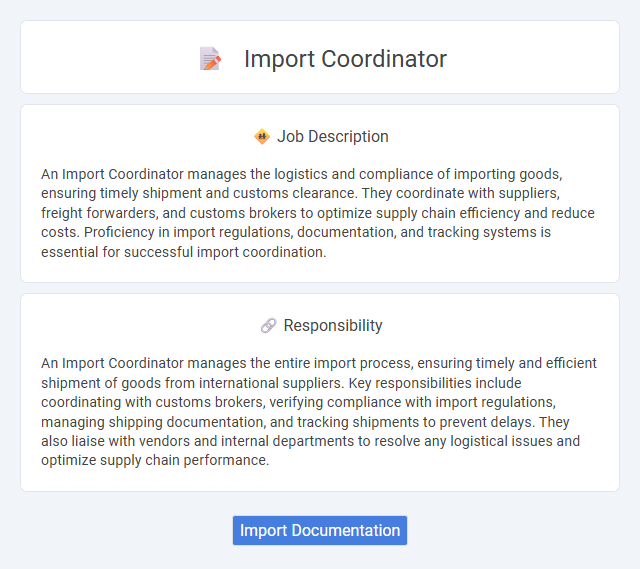
An Import Coordinator manages the logistics and compliance of importing goods, ensuring timely shipment and customs clearance. They coordinate with suppliers, freight forwarders, and customs brokers to optimize supply chain efficiency and reduce costs. Proficiency in import regulations, documentation, and tracking systems is essential for successful import coordination.
Individuals with strong organizational skills and attention to detail are likely to excel as import coordinators, as the job requires managing complex logistics and documentation. People who thrive in fast-paced environments and are comfortable handling compliance regulations and communication with international partners may find this role particularly suitable. Those who struggle with multitasking or prefer less structured tasks might find the demands of this position challenging.
Qualification
An Import Coordinator must possess strong knowledge of international trade regulations, customs compliance, and shipping logistics to efficiently manage import documentation and processes. Proficiency in ERP software and attention to detail are essential for tracking shipments and ensuring timely delivery. A bachelor's degree in supply chain management, business administration, or a related field is typically required, along with experience in import/export operations.
Responsibility
An Import Coordinator manages the entire import process, ensuring timely and efficient shipment of goods from international suppliers. Key responsibilities include coordinating with customs brokers, verifying compliance with import regulations, managing shipping documentation, and tracking shipments to prevent delays. They also liaise with vendors and internal departments to resolve any logistical issues and optimize supply chain performance.
Benefit
An import coordinator likely enhances supply chain efficiency by managing documentation and customs compliance, reducing delays and costs. Their role may improve communication between suppliers and logistics providers, increasing overall operational transparency. Companies stand to benefit from their expertise in navigating international trade regulations, potentially minimizing risks and ensuring timely delivery.
Challenge
Import coordinator roles likely involve navigating complex customs regulations and ensuring timely shipment arrivals, presenting constant challenges that require meticulous attention to detail. Managing communication between suppliers, customs officials, and logistics teams may demand strong organizational skills to prevent delays. The probability of facing unexpected issues such as documentation errors or shipment hold-ups suggests that quick problem-solving abilities are crucial.
Career Advancement
An Import Coordinator manages the logistics and documentation for international shipments, ensuring smooth customs clearance and compliance with trade regulations. Mastery in import regulations, supply chain management, and vendor coordination enhances prospects for promotion to roles like Logistics Manager or Supply Chain Director. Continuous skill development in global trade compliance and ERP systems accelerates career advancement in the import-export industry.
Key Terms
Import Documentation
Import coordinators manage critical import documentation, ensuring compliance with customs regulations and accurate submission of bills of lading, commercial invoices, and packing lists. They coordinate with suppliers, freight forwarders, and customs brokers to verify documentation accuracy and resolve discrepancies promptly. Expertise in harmonized system codes and import permits is essential to facilitate smooth clearance and timely delivery of international shipments.
 kuljobs.com
kuljobs.com